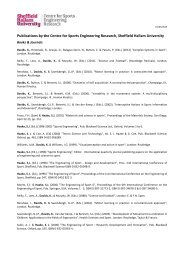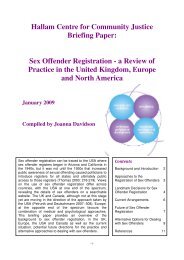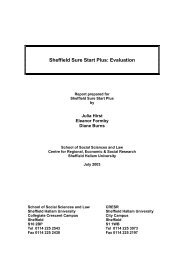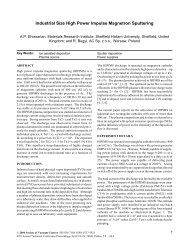The exercise of judicial discretion in rent arrears cases - Sheffield ...
The exercise of judicial discretion in rent arrears cases - Sheffield ...
The exercise of judicial discretion in rent arrears cases - Sheffield ...
Create successful ePaper yourself
Turn your PDF publications into a flip-book with our unique Google optimized e-Paper software.
the basis <strong>of</strong> the orig<strong>in</strong>al possession order;<br />
whether the tenant attended the hear<strong>in</strong>g at which this order was made;<br />
the <strong>arrears</strong> levels at the time <strong>of</strong> the possession order, and at the time <strong>of</strong> the applicant<br />
to suspend the warrant;<br />
any changes <strong>in</strong> the tenant’s circumstances follow<strong>in</strong>g the orig<strong>in</strong>al order;<br />
the tenant’s cur<strong>rent</strong> family circumstances;<br />
what the tenant can afford to pay;<br />
whether any <strong>of</strong>fer is be<strong>in</strong>g made, and if so, how realistic that is.<br />
An important additional factor mentioned by many <strong>of</strong> the judges <strong>in</strong>terviewed was the number<br />
<strong>of</strong> previous applications to suspend, although attitudes to this were divided. Some district<br />
judges operated a rule <strong>of</strong> thumb:<br />
“A first application to suspend is very probably go<strong>in</strong>g to succeed, a second<br />
application may succeed or not, but three is about the limit – unless the earlier<br />
applications to suspend had been close together and/or a fairly long time ago.” (DJ C)<br />
<strong>The</strong> majority said that they “don’t put any limit on the number <strong>of</strong> times as a blanket rule at all”<br />
(DJ G) but would acknowledge that “you get awfully fed up when you’re after about five” (DJ<br />
W).<br />
Relations with landlords<br />
Although this was a very important factor <strong>in</strong> hear<strong>in</strong>g possession claims (see chapter 5), the<br />
focus <strong>of</strong> most district judges at the stage <strong>of</strong> an application to suspend a warrant was on the<br />
tenant. This did not mean, however, that the landlord’s <strong>in</strong>terests were ignored. For<br />
example, one judge expla<strong>in</strong>ed that:<br />
“What I will <strong>of</strong>ten do if someone applies to suspend and I’m not sure, I’ll adjourn it for<br />
a month or two months on terms, and see if they can comply dur<strong>in</strong>g that period. <strong>The</strong><br />
local authority are happy with that because we’re giv<strong>in</strong>g them a test.” (DJ S)<br />
Another said that<br />
“I might appease the landlords by <strong>of</strong>fer<strong>in</strong>g to adjourn it to make sure they pay.” (DJ A)<br />
<strong>The</strong>re was an <strong>in</strong>dication from at least one judge that the difference between private and<br />
social landlords could also be significant when deal<strong>in</strong>g with this type <strong>of</strong> application, who<br />
referred to a recent refusal to suspend a warrant when:<br />
“This was a private landlord, who desperately needs the money from the <strong>rent</strong>, they’re<br />
struggl<strong>in</strong>g…” (DJ Y)<br />
96
















